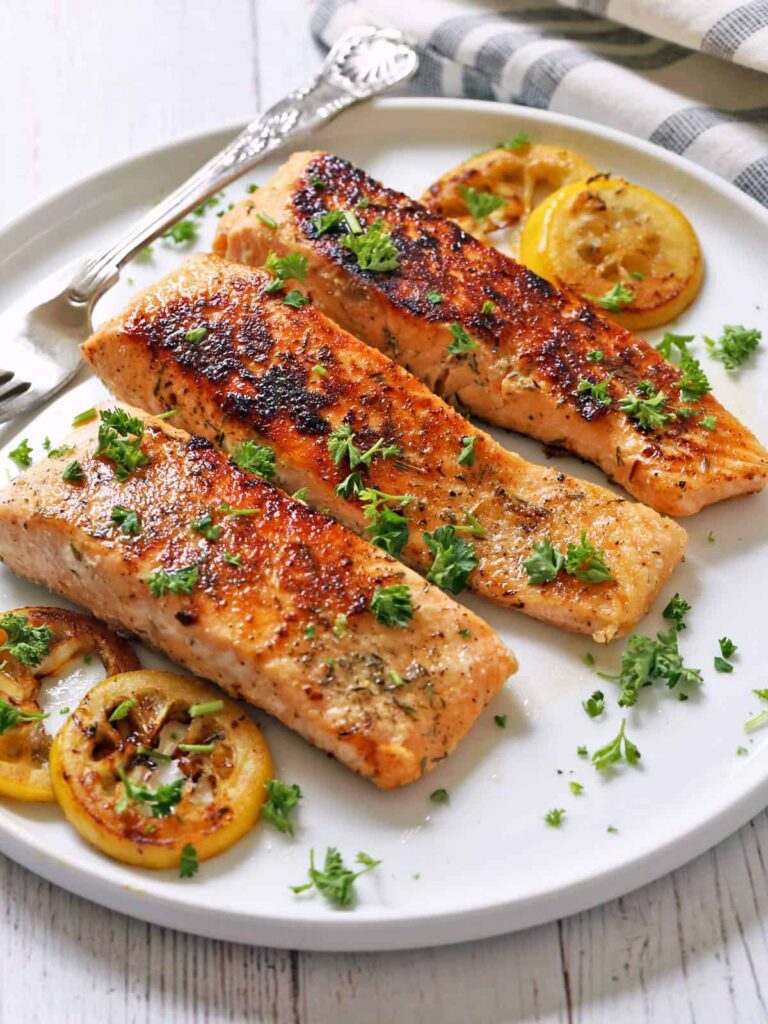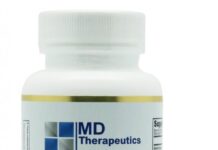What if we told you that eating certain foods can help you manage and reduce anxiety? It includes chicken, beef, and fish such as salmon and other fatty fish.

In a world where everything is a race, issues like social awkwardness, depression, anxiety, etc., continue to rise. According to reports, over 300 million people from all over the world experience the worry and restlessness that anxiety brings. When you get on to find a cure, there is no single way that can reduce this mental health condition. However, every meal allows you to reduce symptoms of anxiety.
The food that you eat every day can help you reduce anxiety. Surely, it cannot cure the condition, but the nutritional values would help lessen the impact. So, what should you consider putting on your plate to get the best out of it? Let’s look at the food items together and help you create a plate for yourself.
Can food lessen anxiety?
There is a saying that food can act like medicine. This idea goes way back to ancient Greece. Today, science is proving how true it is, especially for mental health. What we eat affects how we feel. Nutrition plays a big role in our mood and can even help lower anxiety. Researchers have found strong links between diet and emotional well-being. The right foods support the brain and nervous system. They help the body handle stress better and stay balanced.
Many foods that may ease anxiety have a few things in common. They are often rich in nutrients like magnesium, zinc, omega-3 fatty acids, and B vitamins. These nutrients support brain function and can help regulate mood. Foods high in antioxidants and fiber are also known to help reduce stress. Making small changes to your diet can lead to better mental health. What you put on your plate can support your peace of mind.
Here is the list of foods that will bring a change in your mental health and help reduce anxiety and stress symptoms –
Avocados:
Holy guacamole, indeed! Avocados are not just Instagram darlings; they are brain boosters in disguise. This wrinkly green fruit is loaded with magnesium, a nutrient most of us are missing out on. And when magnesium’s missing, stress tends to move in and get comfy.
Why does magnesium matter? It helps regulate cortisol, the primary stress hormone. It also keeps those brain signals from going haywire by balancing neurotransmitters. Translation: your nerves do not freak out as easily. But the magic does not stop there. Avocados also bring omega-3 fatty acids and fiber to the table. Omega-3s help cool inflammation in the brain, and fiber keeps your gut happy. Trust us, a happy gut means a happier you. So, the next time you are spreading avocado on toast or tossing it in a salad, know you are doing your mental health a solid. This trendy fruit actually earns its hype and then some.
Salmon:
If you are fishing for the perfect anxiety-busting food, wild salmon is the ultimate catch of the day. It is rich in omega-3 fatty acids, those healthy fats that work wonders on your brain. Omega-3s are known for their calming effects and can help tone down inflammation, which often plays a sneaky role in triggering anxiety. But salmon does not stop at just one perk. This fish is also swimming in magnesium, protein, vitamin B12, and vitamin D. That is a full-on nutrient package designed to keep your mind calm and collected.
And while salmon tends to hog the spotlight, it is not the only fish in the sea with mood-boosting powers. Other omega-3-rich options worth reeling in include herring, bluefin tuna, mackerel, sardines, anchovies, lake trout, and striped bass. Each one brings its own blend of brain-loving benefits to your plate. So, whether it is grilled, baked, or served with a splash of lemon, adding fish to your routine could be just what your nerves ordered.
Beef:
Red meat gets a bad reputation in the market and for good reason. Too much of it has been linked to heart disease, cancer, and diabetes. So no, a burger a day will not keep the doctor away. But there is a twist: beef still brings some real benefits to the table. It is packed with protein and vitamin B12, two nutrients that can help take the edge off anxiety. Protein keeps blood sugar and cortisol levels steady in your body, while B12 offers a much-needed energy boost when stress hits hard.
So how do you enjoy beef without going overboard? You can start by watching your protein intake. A proper serving is just 3 ounces. It is about the size of a deck of cards. That is a lot smaller than what most people pile onto their plates. So, limit beef to once or twice a week and go for grass-fed cuts when you can. They tend to be richer in nutrients and kinder to your body.
If beef is not on the menu, chicken steps up as a healthy backup. It is full of protein and B vitamins, too. Just make sure to stick with fresh cuts. Processed meats like hot dogs, sausages, and deli slices do not offer the same nutritional bang. They also often come with added junk. Another important tip would be to mix your protein sources up. Lean into variety when it comes to protein. That includes tossing in some plant-based options. Your brain and body will thank you for the nutrient upgrade, and you will not get bored with eating the same thing again and again at dinner.
Eggs:
Eggs crack the anxiety code with a familiar formula. They are loaded with protein and vitamins B12 and B7. This is just like beef and chicken. These nutrients help balance your mood and keep a steady energy level, while supporting overall brain function. That is a winning combination for anyone who is looking to feel a little more grounded in life.
Now, eggs have taken some heat in the past for their cholesterol content, especially the delicious yolks. But here is the truth: eggs are nutritional powerhouses. The yolk holds most of the vitamins, so skipping it means you are missing out on a lot. So, what is the key? The simple answer is moderation. One yolk a day works just fine for most people. So scramble them, boil them, make a curry, or whip up an omelet. Eggs are an easy and affordable way to fuel your body and mind. Just do not let outdated myths stop you from enjoying one of nature’s most egg-cellent anxiety-fighting foods.
Vegetables:
Vegetables always seem to pop up on every “eat this to feel better” list. When it comes to anxiety, they bring more than just crunch and color to your plate. Many vegetables are packed with fiber, and fiber works behind the scenes to feed the good bacteria in your gut. These are called prebiotics, and they help keep your gut microbiome in top shape. Why does that matter? Because your gut and brain are in constant communication. A healthier gut often means a calmer, more balanced mind. So, are you looking to up your fiber game? Load up on broccoli, carrots, green beans, and leafy greens like spinach. These veggies are gut-friendly powerhouses. Add them to your meals in any form. You can consume them steamed, roasted, raw, or blended into a smoothie if that is your style. Most importantly, yes, your mom was right: eating your veggies really can help you feel better from the inside out.
Yogurt:
Yogurt and its non-dairy cousins might be your gut’s favorite snack. These creamy treats are loaded with probiotics, which are the friendly bacteria that keep your digestive system in check. When your gut is happy, your mind tends to follow soon after. That is because your brain and gut are basically BFFs, constantly chatting and exchanging signals more than any other system in your body. When your gut microbiome is off balance, it can throw your mood out of whack and ramp up anxiety. But feeding those good bacteria with probiotic-rich foods like yogurt helps restore that balance and keep things calm.
There is another bonus of eating yogurt every day. Many types of yogurt, especially Greek yogurt, are packed with protein, another nutrient that plays an important role in managing anxiety. It helps stabilize blood sugar and keep energy levels steady. Now, not all yogurt is created equal. Plain yogurt is the best pick for anyone. You can steer clear of the flashy options filled with added sugars, candy bits, or syrup swirls. If you are craving flavor, toss in some fresh food or a handful of nuts. You can also drizzle pure honey or maple syrup to make it taste better and sweeter. So, go ahead, spoon up some yogurt. It works as more than just a snack. Yogurt is a simple way to give your gut and your mood a little love from your end!
Chamomile:
Chamomile is widely known as the sleepytime tea. However, it is also helpful to take the edge off anxiety. This gentle herb is packed with antioxidants and anti-inflammatory properties that can help calm the body down. It especially works when inflammation is involved in stress responses. Though researchers are still piecing together the full picture, chamomile appears to affect neurotransmitters tied to mood. The connection also includes serotonin, dopamine, and GABA. These brain chemicals play a big role in how relaxed or not you feel. Chamomile may also help regulate the HPA axis. It is your body’s control center for stress.
Studies exploring chamomile’s charming powers show pretty solid results. One study in 2017 was conducted on 179 people with generalized anxiety disorder and found that those who took 1,500 milligrams of chamomile extract daily experienced a noticeable drop in symptoms. While that is exciting, it is worth noting that most research has focused on concentrated extracts rather than your average cup of tea. So, while sipping chamomile tea might feel soothing to you, more research is needed to prove just how effective it is for anxiety. Still, it is a warm and comforting option for the times you are feeling anxious. This alone can go a long way when stress tries to steal the show from you.
Turmeric:
Turmeric has long been a kitchen staple, but it is also gaining attention as a brain-boosting spice. This is all thanks to curcumin, its star compound. Curcumin is known for its strong antioxidant and anti-inflammatory powers, which may help protect the brain from damage caused by chronic inflammation and oxidative stress. Since both are often linked to anxiety, curcumin’s protective qualities make it a promising ally in managing mood. Researchers also suggest it could support the brain’s overall health and help prevent anxiety-related disorders over time.
Animal studies have also shown even more potential. One 2014 study found that curcumin may help convert plant-based omega-3s (like ALA) into DHA. It is a type of fat that is crucial for brain function. In addition to this, a 2019 human trial happened where 80 people with diabetes participated. These people who took nano-curcumin supplements daily for eight weeks reported noticeably lower anxiety levels compared to those taking a placebo. Nano-curcumin is a smaller and more easily absorbed version of the compound, which may explain the strong results. However, most of these studies focus on concentrated curcumin supplements, not turmeric used in everyday cooking. So while adding turmeric to your meals cannot hurt, and might help, more research is needed before calling it a cure-all. Still, it is a golden spice with golden potential.
Pumpkin seeds:
Pumpkin seeds may be tiny, but they pack a punch when it comes to supporting your mental health. These crunchy little gems are loaded with potassium, an essential mineral that helps manage blood pressure and keep your body’s electrolyte balance in check. That is a big deal, especially since low potassium, along with low magnesium, has been linked to high levels of cortisol. It is the hormone your body releases when stress kicks in. Adding potassium-rich foods like pumpkin seeds or bananas to your diet might help dial down stress and anxiety symptoms.
But that goodness of pumpkin seeds does not stop here. These are also highly rich in zinc, another mineral that plays a major role in emotional health. It was found in one study of high school girls that lower zinc levels were linked to higher rates of mood disorders, including anxiety and depression. Since zinc helps with brain and nerve development and is mostly stored in brain areas tied to emotions, getting enough of it could help keep your mood steady. So, snack on pumpkin seeds for a simple and tasty way to boost your mood and brain.
Dark chocolate:
Adding a little dark chocolate to your daily routine might do more than just satisfy a sweet tooth. It could also help take the edge off anxiety. Dark chocolate is rich in flavonols like epicatechin and catechin, which are powerful antioxidants known to support brain health. These compounds may boost blood flow to the brain and improve cell-signaling, which can help the brain respond more calmly to stress. A 2017 study pointed to the neuroprotective perks of these flavonols, while a 2019 study involving over 13,000 people found that those who ate dark chocolate showed lower signs of depression. Some researchers even suggest that the simple joy of eating chocolate might offer comfort for those struggling with mood issues. Here, no science lab was needed.
But as tempting as it is to eat a whole bar, moderation matters the most. You need to stick to 1 to 1.5 ounces at a time. That way, you get the mood-boosting benefits without overloading on sugar or calories.
Almonds:
Almonds are a tasty and healthy snack. But, they are also little brain boosters loaded with healthy fats and vitamin E. These are both known for supporting mental sharpness and emotional balance. The crunchy nuts have also shown potential in reducing oxidative stress and inflammation, two sneaky culprits that may play a major role in developing anxiety.
Animal studies suggest that almonds could help protect the brain from this kind of internal chaos. But there is so much more to it. A study in 2016 found that people who ate more nuts, including almonds, showed fewer signs of depression. Another study that occurred in 2020 involved more than 3,000 adults. This study found that the men who ate more nuts were 66% less likely to experience anxiety than those who ate the least. You can say that is a nutty win! Although the same results were not seen in women, this further highlights that we still have a lot to learn about nuts and women’s bodies.
So while almonds are not a magic fix, they are definitely worth tossing into your daily routine. Sprinkle them on oatmeal, blend them into smoothies, or just grab a handful when you need a boost; your brain might thank you!
Green tea:
Green tea has a well-earned reputation for calm vibes, and science backs it up. One of its most important ingredients is L-theanine, an amino acid that may work wonders on anxiety and brain health. A study in 2019 found its potential, while earlier research from 2016 found that people who drank an L-theanine-rich beverage reported lower stress and reduced levels of cortisol. So what is L-theanine doing behind the scenes? It may help prevent nerves from going into overdrive and could boost the brain’s feel-good chemicals like GABA, dopamine, and serotonin. These are all known to help dial down anxiety and stress-like feelings.
But green tea is not a one-hit wonder. It also contains epigallocatechin gallate (EGCG), a powerful antioxidant with its own brain-boosting benefits. EGCG might also raise GABA levels, which helps explain why sipping green tea can feel so soothing. Even better, these compounds, such as L-theanine, EGCG, and others, seem to work best as a team. Together, they create a calming combo that may be more effective than taking them separately. That is synergy in a teacup. While green tea is not a cure-all, it is definitely a tasty and relaxing option to include in your anxiety-fighting toolkit. Just one more reason to sip and unwind!
Blueberries:
Blueberries may be small in size, but when it comes to brain health and mood support, they are nothing short of mighty. They are packed with vitamin C and flavonoids, which are powerful antioxidants. These vibrant berries have been studied for their potential to ease anxiety and sharpen brain function. Antioxidants like these help fight oxidative stress, a factor that can mess with your mood and mental clarity.
A 2020 study took a closer look and found that teens who consumed wild blueberry supplements daily for four weeks reported fewer signs of depression. Animal studies also back it up and suggest compounds in blueberries may help reduce both depression and anxiety symptoms by calming inflammation in the brain. There is more good news as well. Some research shows that eating more fruits, especially antioxidant-rich ones like blueberries, may be linked to a lower risk of developing anxiety. While the science is still catching up, the early results are promising. So, toss some blueberries into your breakfast or snack on them solo. Your brain will surely be thankful!
Other foods that might help you ease anxiety
- Turkey, bananas, and oats all bring something calming to the table: tryptophan. This amino acid gets converted into serotonin, the brain’s feel-good chemical that helps promote relaxation and ease anxiety. Adding these foods to your meals might give your mood a gentle boost while keeping stress in check. So yes, your post-turkey nap might have some science behind it after all.
- Chia seeds may be tiny, but they’re packed with brain-loving omega-3 fatty acids. These healthy fats have been linked to lower anxiety and better mood support. Sprinkle them on yogurt, toss them in smoothies, or stir them into oatmeal for an easy mental health boost in every bite.
- Citrus fruits and bell peppers are not just colorful. They are packed with vitamin C, which is a powerful antioxidant that helps fight off inflammation and cell damage. Since inflammation and oxidative stress are both linked to anxiety, getting enough vitamin C may help keep your mind more balanced. Oranges, lemons, limes, and peppers all offer a tasty way to load up on this mood-supporting vitamin. Snack on them fresh or add them to meals for a simple, tangy way to boost your mental well-being.
Food you need to avoid
You can keep your anxiety down by simply avoiding a handful of foods that stress the body. Such as –
- Alcohol might feel like a quick fix for anxiety, but it is more of a trap than a cure. While it can create a temporary sense of calm, it is actually a depressant that messes with your brain chemistry and sleep. Over time, it can make anxiety worse, not better. So that glass of wine may take the edge off now. But it could sharpen it later. So, sip with caution.
- Caffeine gives your body a quick energy boost, but it can also crank up your nervous system. It raises your heart rate and may leave you feeling jittery or on edge. This is especially not ideal if you are already prone to anxiety. So, that morning cup might wake you up, but too much could have your nerves buzzing for all the wrong reasons.
- High-sugar foods and refined carbs might taste great at the moment. But they can throw your mood into chaos. Sweets, pastries, white bread, sugary drinks – they all cause rapid spikes in blood sugar, followed by sudden crashes. These ups and downs can lead to mood swings, irritability, and, of course, increased anxiety. That sugar rush might feel fun for a few minutes, but it often leaves you feeling more stressed and shaky afterward. Over time, regularly eating high-sugar foods can mess with your body’s ability to manage stress and keep your energy stable. A little treat here and there is fine, just do not let sugar steer the ship.
- Trans fat may give your food a crispy crunch, but they are not doing your brain any favors. They are found in fried foods, packaged snacks, and some baked goods. Trans fats fuel inflammation in the body, including your brain. That is bad news for your mood, since a steady diet of trans fats can leave your mental health feeling just as greasy as your fries.
Anxiety is a complex mental health condition and often needs more than one approach to manage. While medication and therapy are essential, your diet can also play a super helpful role. As a whole, minimally processed foods rich in antioxidants may support brain health and ease anxiety symptoms. Still, food alone is not a replacement for professional treatment, and it should not take the place of prescribed therapies. That said, adding brain-friendly foods to your meals is a smart and supportive step toward better mental health and overall well-being.



















